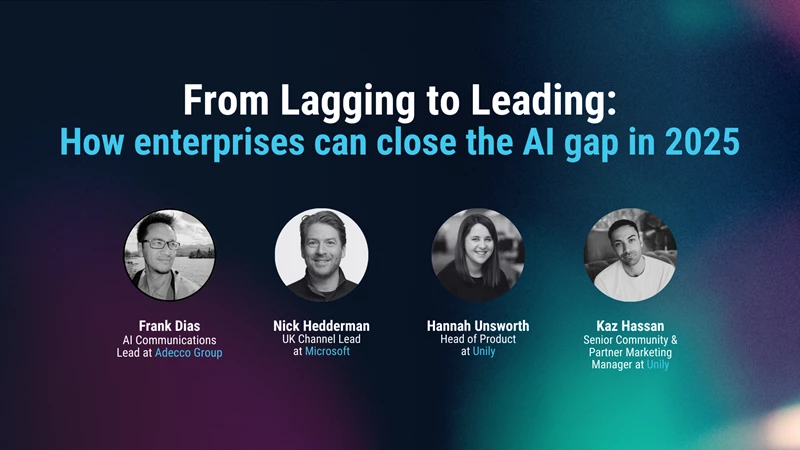Creating a culture of belonging in the hybrid workplace: 4 key takeaways
The future of work is hybrid – but what does this mean when it comes to workplace culture? We recently partnered with strategy consulting firm, Gagen MacDonald, to host a webinar that explains actionable ways to build a culture of belonging in a hybrid world. Here are the 4 key takeaways you should know.

What is organizational belonging?
Workplace culture took a hit throughout 2020, as remote working meant that employees were more isolated, and consequently felt less connected to their colleagues and the business. Having a positive and inclusive culture is incredibly important for an organization to succeed, and so companies need to put the focus back on creating this culture of belonging within a hybrid workplace.
"Belonging involves feeling comfortable at work, including being treated fairly and respected by colleagues. It means feeling connected to the people you work with and the teams you are part of, and the feeling that you contribute to meaningful work outcomes. Belonging also includes a feeling that you can “be yourself” without the need to put on a mask to be effective in the workplace. But belonging is more important as we continuously become remote, digital, and disconnected. The dehumanization of work is not helping belonging, people are craving humanity in the workplace more than ever."
With interesting insights from Casey Croslin, Psy.D, Senior Manager at Gagen MacDonald; Abigail Covington, Consultant at Gagen MacDonald; and Matthew Boyd, Unily’s product evangelist, the hour-long webinar explained how companies can look at creating a positive and inclusive culture of belonging for all.
4 things you need to know when it comes to creating a culture of belonging
During the webinar, the speakers all shared their insights, information, and anecdotes to discuss what the organizational culture deficit is, why belonging is so important to enterprise success, and how companies can best use technology to create a sense of belonging. Here are the 4 key takeaways.
#1. There is a direct link between belonging and organizational success
According to Deloitte, 79% of organizations say fostering a sense of belonging in the workforce is important or very important for their success over the next 12 to 18 months, but only 13% say they are very ready to address this trend.
Organizational efforts to foster belonging have historically and primarily focused on making every individual feel respected and treated fairly in an inclusive work environment. While this remains foundational, leading businesses are now forging a stronger link between belonging and company performance by strengthening workers’ connections with their teams and fostering their sense of contribution to meaningful shared goals.
"We humans are social beings, we are wired for membership in a group. When we must devote mental resources to monitoring our environment for cures of rejection and suspicions that we don’t belong – they are mental resources that can’t be allocated to higher cognitive functions such as creativity, innovation, critical thinking – this ultimately impacts performance and productivity. When workers appreciate how their individual work helps to advance goals they support and find meaningful, they will likely be more engaged, more motivated, and more likely to perform at a high level."
#2. If DEI is ever going to be a priority, it has to be realized through compassion
DEI (diversity, equity, and inclusion) has been a hot phrase after the past year of socio-political unrest, and many companies have started to talk about DEI and release mission statements. But a lot of organizations have also shown that they don’t fully understand what that means.
As Abigail pointed out during her talk, a huge telltale sign of companies being out of touch with their ‘DEI mission’ statements is employees' lack of willingness to want to return to in-person work environments. The New York Times recently published an article about women of color being particularly hesitant to return to the workplace, citing a Slack think tank survey that found 97% of black employees would rather continue working from home. Only 3% were interested in returning to the office.
"People have gone from being comfortable at home in their own culture to having to face returning to a space where they’re forced to conform in order to succeed. People will not maximize their creativity and innovation, which leads to gains and business wins for the organization when they feel repressed in their own skin. Oftentimes, this leads to attrition (currently in double digits for several POC groups across sectors). Belonging must be innate to their work experience for them to feel comfortable fully showing up for themselves and their teams."
To promote a sense of compassion in the workplace, companies should look at creating spaces for compassion – either in person or virtually through technology such as social features of an intranet platform – for employees to feel like they have a safe space to connect with other colleagues and holistically improve their overall working experience.
#3. Leader buy-in is required for success
Nothing about what’s been said matters if leaders are not engaged and aligned on the necessity of creating communities of belonging. Whenever you’re attempting to infuse ideas and central themes into your core purpose, leaders have to be committed to the change, as they represent the initial reception to the change prior to employees.
"When companies can foster a sense of belonging for people of all experiences, backgrounds, and walks of life, they yield more diverse workforces and curate culture. Many companies are concerned with whether or not new employees fit the current culture. In reality, the question should be, what are you bringing/adding to our culture that we don’t already have? The strategy of creating environments of belonging helps to create structures of diverse and inclusive work environments with multifaceted skillsets, bringing a culture of equity and compassion to the whole of the organization. But, it has to be aligned through the buy-in and commitment of leadership."
#4. Technology is pivotal for creating a sense of belonging in a hybrid workplace
A major concern for many enterprises is how to best create inclusive workplaces. At Unily, we believe a big part of building a more inclusive workplace is investing in the right digital tools, especially as we move to increased flexible working which enables people to work from any location. Digital will continue to rise as a prominent place as to where these conversations will happen.
"We believe in creating a true digital home – it’s a home because everyone feels comfortable at home. People can feel like they can be themselves and an intranet can create a shared digital home to bring people together and share ideals and values. Intranets and employee experience platforms represent the perfect place to combine these two aspects – the mission and story of business and a home for your people."
Look to social tools to put community at the core
Social channels not only break down barriers and bridge the gap between your international and disparate workforce, but they also provide safe spaces for communication and discourse. This encourages employees to share ideas, stories, and opinions about the topics that matter the most to them, overall contributing to an inclusive culture of belonging for all.
Make sure your technology is accessible for all
According to the World Health Organization, 15% of the world’s population lives with some form of disability, which equates to roughly 1 billion people. Not catering your digital advancements to this large group of people means overlooking them in business plans, essentially meaning you are not enabling these people to reach and contribute to their full potential. To nurture a sense of belonging for all, look to technologies that are WCAG 2.1 AA compliant, have keyboard navigation, and have screen-reader and narrator options.
Mobile-first should be a high priority
Inclusivity also includes the changing shape of employee roles, and this includes the fact that many enterprises have deskless and frontline employees. To reach them and ensure their needs are also met and provided for, having a mobile intranet is key. A mobile application means frontline employees have their enterprise intranet in their pocket, keeping them connected to the business wherever and whenever.
Use technology to create a culture of belonging within your hybrid workplace
In our ever-evolving digital age, digital tools are the answer to ensuring the employee experience is always of high quality, positive and inclusive.
You can watch the full webinar here:














